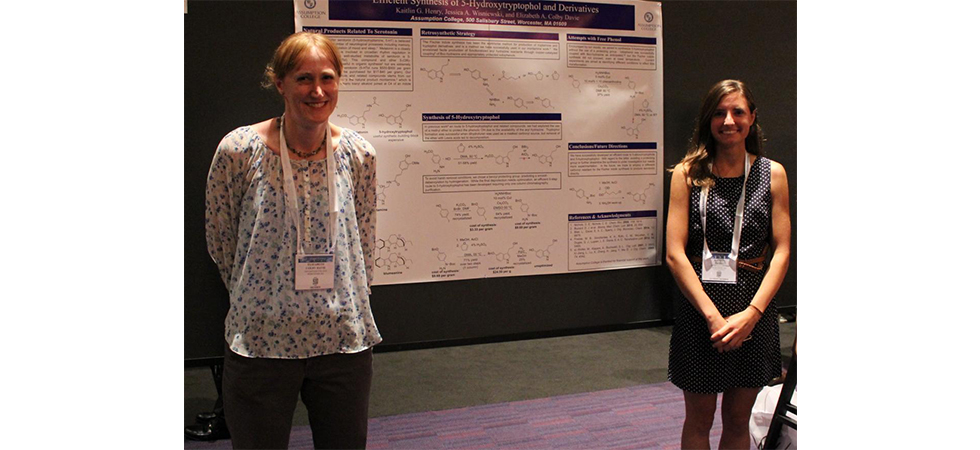Student-Faculty Team Publishes Research Project in Prestigious Scientific Journal

A recent faculty and student collaboration to research cancer-fighting elements found in plants resulted in a scholarly article published in a prestigious scientific journal.
Assumption Professor of Chemistry Elizabeth Colby Davie, Ph.D., and Kaitlin Henry ‘16 are one of many examples of the mutual benefits of student-professor research.
Prof. Colby Davie, who holds a doctorate in organic chemistry, has studied for a number of years a chemical compound called montamine. The compound, a chemical naturally found in plants, was found to, in early studies, to have cancer-fighting properties. Prof. Colby Davie explained that she and the student collaborators with whom she has worked with in the past have attempted to artificially synthesize the chemical compound in the lab but were stymied by one significant challenge: they found that the researchers who first discovered montamine had made a mistake in documenting the compound’s composition.
The project had now changed. Encouraged by her past efforts to recreate montamine in the lab, Prof. Colby Davie now sought to discover, and correct, the flaw in its recorded composition.
It was at this point when Henry, then a rising junior, joined Prof. Colby Davie in her research. After ten weeks of extensive experimentation in the Assumption lab located in the Testa Science Center, the pair discovered the data they needed to correctly map the compound’s construction.
“Each day always consisted of smaller, chemistry-based experiments that I would need to work through on my own,” Henry said. “It was sometimes even as simple as finding a base that could neutralize some left over acid in a flask, or diluting a mixture to the right percent.”
Those little experiments, however, added up. Because a great deal of the lab work was completed by Henry, she is listed as the lead author on the published work.
Henry explained that the research process for this project was both “exciting and unexpected.” She noted that research can be extremely unpredictable in the sense that the outcome can be something completely the opposite of the original prediction.
“We just tried an idea out on a simple compound,” Henry said. “The surprising part was it worked. Normally research doesn’t go that well.”
After they had completed their studies, the pair began to document them in a scholarly article, which became a time-consuming process due to collaboration with researchers more than 9,000 miles away.
“Writing the paper took a few months, partly because we collaborated intellectually with scientists in New Zealand,” Prof. Colby Davie said. “We had to pass drafts back and forth with time zone differences, and this took some time.”
When the pair was finished with the paper, which took about five months to complete, they submitted the finished product to Organic and Biomolecular Chemistry, a journal of the Royal Society of Chemistry, where it was reviewed and published in August.
Henry is grateful for this opportunity to conduct high-level research at the undergraduate level and credits Prof. Colby Davie’s support as a significant influencer of her success. According to Henry, Prof. Colby Davie encouraged her to approach her topic in an abstract way, due to the experiment-based nature of the project.
“As we were thinking through a problem, she would pose questions and listen to my ideas, rather than just sort it out on her own and tell me what to do,” Henry said. “She had a way of making us a part of the research so that we could be comfortable enough o pose questions and try things, even if they might not work.”
Henry’s accomplishments have provided her with vital experience that she will take with her as she moves forward in her career. She is currently pursuing her master’s degree in theology at the John Paul II Institute at Catholic University of America in Washington, D.C., where she plans to complete the Institute’s biotechnology and ethics track, followed by a Ph.D. in theology and philosophy. Henry ultimately hopes to “teach at the university level in order to foster and maintain liberal arts education in the United States.”
To read the abstract of the published work written by Henry and Prof. Colby-Davie, click here.
